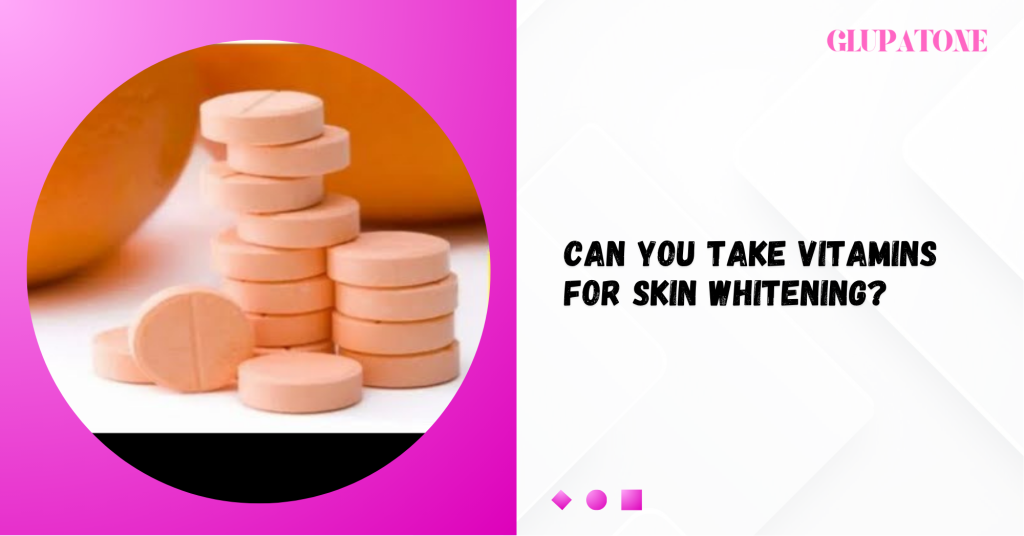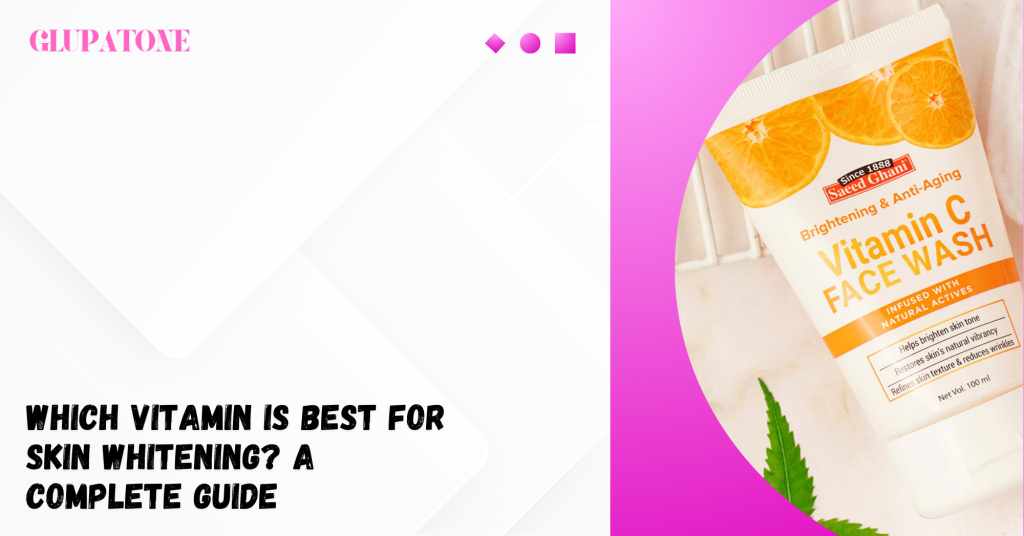Introduction to Vitamins for Skin Whitening
When it comes to glowing, even-toned skin, vitamins do more than just keep you healthy—they can transform your skin from dull to dazzling! Skin whitening (or brightening) is often about reducing dark spots, evening out the tone, and bringing back your natural glow. And yes, vitamins play a huge role in all of this. so you might ask Which Vitamin Is Best for Skin Whitening. We have the answer.
Why Vitamins Play a Key Role in Skin Brightness
Vitamins work at the cellular level. They repair damage, boost collagen, and fight pigmentation caused by sun, stress, or aging. Instead of covering up the skin’s flaws, they actually help fix them from the inside out. That’s why they’re found in everything from serums to supplements.
How They Affect Skin Tone and Clarity
Certain vitamins specifically target melanin production (that’s the pigment in our skin), helping fade dark patches and stop new ones from forming. Others soothe inflammation or help your skin heal faster. The result? A smoother, clearer, brighter-looking complexion—without harsh bleaches.
Which Vitamin Is Best for Skin Whitening?
It’s the question everyone asks! While multiple vitamins help brighten the skin, a few stand out because of their scientific backing and amazing results.
Overview of Key Skin-Brightening Vitamins
Here are some of the top names in the glow game:
- Vitamin C – fights pigmentation and dullness
- Vitamin B3 (Niacinamide) – evens skin tone and controls oil
- Vitamin A (Retinoids) – boosts cell turnover
- Vitamin E – soothes and supports glow
- Glutathione – brightens from within as an antioxidant
Each works in its own way, and the best part is—you can mix and match them safely with proper guidance.
Top Choices Backed by Skincare Experts
Dermatologists often recommend Vitamin C and Niacinamide as the safest, most effective options for everyday use. They work well on all skin types, especially when paired with sunscreen. For more dramatic results (like fading acne scars), retinoids or glutathione may be suggested—though these should be used under expert supervision.
Vitamin C: The Brightening Powerhouse
If you’re new to skin brightening, Vitamin C is your best friend. It’s one of the most talked-about ingredients in skincare—and for good reason.
How It Fades Dark Spots and Evens Skin Tone
Vitamin C helps slow down melanin production, which makes it great for fading dark spots, sun damage, and acne marks. It also boosts collagen, giving your skin a firmer, more radiant look. And yes—it even helps protect against pollution and UV damage!
Top Sources and Serums with Vitamin C
You can get Vitamin C from:
- Fresh fruits like oranges, lemons, and kiwi
- Topical serums (look for 10–20% L-ascorbic acid for effectiveness)
- Supplements (consult a doctor before taking)
A popular pick? A lightweight Vitamin C serum applied in the morning under sunscreen. It wakes your skin up so beautifully!
Illuminate Your Beauty—Start Your Skin Brightening Journey with Glupatone.
Reveal a Brighter, More Radiant You—Experience Glupatone Today!
Vitamin B3 (Niacinamide): Gentle Yet Effective
Don’t let the science-y name scare you—niacinamide is one of the gentlest yet most effective skin brighteners out there.
Benefits for Hyperpigmentation and Dull Skin
Niacinamide works like magic to fade hyperpigmentation, reduce redness, and make your skin tone look more even. It also helps improve your skin’s barrier, which means less dryness, irritation, or sensitivity.
It’s especially helpful if your skin can’t handle Vitamin C or stronger actives.
Ideal for Sensitive or Acne-Prone Skin
Got breakouts? Dealing with redness? Niacinamide is perfect. It controls oil, tightens pores, and calms inflammation—without causing peeling or stinging.
You’ll find it in many drugstore serums and moisturizers, often at 5–10% concentration. It plays well with others too, so feel free to pair it with hyaluronic acid, zinc, or Vitamin C (in the right routine!).
Vitamin A (Retinoids): For Faster Cell Turnover
Want smoother, clearer skin that renews itself? Vitamin A—also known as retinoids—is the go-to for just that. It speeds up cell turnover, which means dull or pigmented skin gets replaced faster by fresh, radiant layers.
How It Reduces Pigmentation Over Time
Retinoids help fade dark spots, acne scars, and uneven skin tone by encouraging your skin to shed dead cells and produce new ones. Over time, this helps your complexion look brighter, more even, and youthful. The results aren’t instant, but with consistency, it truly works wonders.
Precautions and Best Application Tips
Retinoids can be a bit strong, especially if you’re new to them. Start slow—use a small amount two to three times a week at night. Always follow with a moisturizer and never skip sunscreen in the morning, as retinoids make your skin more sun-sensitive.
Also, avoid using Vitamin C and retinoids together unless a professional guides you—they can be irritating when layered wrong.
Vitamin E: Antioxidant Support for Brighter Skin
Vitamin E is your skin’s calming bestie. It doesn’t whiten your skin directly, but it supports your glow by healing and hydrating.
Role in Repairing Skin and Boosting Radiance
As a powerful antioxidant, Vitamin E fights free radicals, which are known to cause dark spots and dullness. It also nourishes dry or damaged skin, making it look soft and luminous. It’s perfect if your skin needs a bit of love and repair!
Combining with Other Vitamins for Better Results
Vitamin E works best when paired with Vitamin C. Together, they enhance each other’s antioxidant powers and help brighten your skin more effectively. You’ll often find this duo in brightening serums, creams, and even face oils.
Just remember, Vitamin E is oil-based, so if you have oily or acne-prone skin, go easy with it or pick lightweight formulas.

Can You Take Vitamins for Skin Whitening?
Absolutely—but with a little caution. Oral supplements can help brighten your skin from within, especially if you’re deficient in certain vitamins. But they’re not miracle pills, and not all are created equal.
Oral Supplements vs. Topical Application
Topical vitamins (like in serums and creams) work directly on the skin surface. Supplements, on the other hand, support your skin’s glow from the inside out. For example:
- Vitamin C pills can help improve skin tone over time.
- Glutathione capsules are popular for skin lightening, but they should be used under supervision.
- Multivitamins with zinc and biotin can also support healthy skin.
What Works Best According to Experts
Most dermatologists agree: topical application is the safest, most effective method—especially for targeted treatment. Supplements may help, but they work slower and should be chosen carefully.
Important: Always consult your doctor before starting any supplement. Some combinations can interfere with medications or cause unwanted side effects.
How to Include Whitening Vitamins in Your Routine
Ready to build your glow-up routine? Here’s how to do it the smart way!
Best Time and Method of Application
- Morning: Use Vitamin C under your sunscreen to protect and brighten.
- Night: Apply niacinamide or retinol (Vitamin A) for overnight repair.
- Weekly masks or creams with natural ingredients (like licorice or kojic acid) can be added for extra support.
And always start with cleansed, toned skin so the vitamins absorb properly.
Combining Vitamins Safely
Yes, you can combine vitamins—but do it wisely!
- Vitamin C + Niacinamide: Totally safe and brightening
- Vitamin A + Niacinamide: Great at night but start slow
- Vitamin C + E: A power-packed antioxidant duo
- Avoid Vitamin C + A together unless a product already blends them safely
If you ever feel redness, dryness, or tingling, ease up and try using them on alternate days.
Precautions and Side Effects
Even though vitamins can be your skin’s best friend, it’s always smart to play it safe. What works beautifully for one person might not work the same way for someone else—especially when it comes to brightening ingredients.
When to Stop or Consult a Dermatologist
If you notice redness, itchiness, stinging, or breakouts, it’s time to pause. Some vitamins—especially Vitamin A (retinoids) and high-strength Vitamin C—can be too strong for sensitive skin or first-time users.
If the reaction doesn’t go away after a couple of days or gets worse, please see a dermatologist. They’ll guide you toward what’s best for your skin type and concerns.
Skin Reactions and Ingredient Sensitivities
Some combinations may not suit everyone. For example:
- Retinoids can dry out the skin if not used with a moisturizer
- Too much Vitamin C can cause tingling or peeling
- Vitamin E might feel heavy on oily skin
Also, always do a patch test before trying a new serum or cream—especially if it’s your first time using actives.
Note: This content is for informational purposes only. Always consult a skincare expert or dermatologist before starting any new routine.
Beauty That Reflects You—Brighten Naturally with Glupatone.
Target Hyperpigmentation at Its Core—Glupatone Does the Work While You Glow!
Conclusion: Choosing the Right Vitamin for You
Skin whitening doesn’t mean changing who you are—it’s about feeling confident in your natural skin. And the right vitamins can help you get there gently and safely.
Whether you go for Vitamin C for daily glow, niacinamide to fight spots, or retinoids for long-term clarity, consistency and care are key. Listen to your skin, keep it protected (hello, sunscreen!), and don’t rush the process. You can find Vitamin C in Glupatone.
Everyone’s skin journey is unique—choose what suits YOU best.
Frequently Asked Questions (FAQs)
Can I use Vitamin C and Niacinamide together?
Yes, they work well together and are safe for most skin types. Just start slow if you’re new to both.
Is it safe to take whitening vitamins daily?
Some are, but always consult a doctor before starting daily supplements to avoid overuse or side effects.
Which vitamin works fastest for skin lightening?
Vitamin C shows visible brightness within 2–4 weeks, while retinoids take longer but offer deeper results.
Are vitamin-based creams better than supplements?
Topical creams work directly on the skin, so they often give faster, more visible results than supplements.
Can teenagers use whitening vitamins?
Yes, but stick with gentle options like niacinamide or mild Vitamin C, and always consult a skincare expert first.
Do these vitamins permanently lighten the skin?
No, results may fade if you stop using them. They help maintain brightness, not permanently change skin tone.
What foods are rich in skin-whitening vitamins?
Citrus fruits, berries, tomatoes (Vitamin C), nuts and seeds (Vitamin E), carrots (Vitamin A), and eggs (Niacinamide).
Should I talk to a dermatologist before taking supplements?
Definitely. It ensures you choose the right dosage and avoid interactions with other medications or skincare.
Read More:

